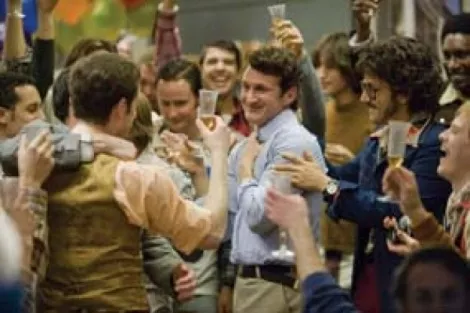
It’s pointless to speculate about a world in which we react to movies in a historical and temporal vacuum. Thirty years ago, The China Syndrome dealt with a hypothetical near-catastrophe at a nuclear power plant; just 12 days after it was released, an accident at Three Mile Island turned the film into a national catchphrase. Some movies just happen to appear at a moment when the world around them imbues them with a significance that could not possibly have been intended from the outset.
Milk appears only a month after a fiercely contested battle over gay rights in California. And, as it happens, one of the central dramatic events in the film involves—you guessed it—a fiercely contested battle over gay rights in California. It’s hard to shake the emotional reaction that comes from watching the history that eventually would repeat itself—even as it’s hard to shake the feeling that, without such a context, Milk would feel like a fairly mundane cinematic biography.
Its subject certainly is a compelling figure: Harvey Milk (Sean Penn), who emerged from a lifelong closet in his early 40s after moving to San Francisco’s Castro district in 1972 with his boyfriend Scott (James Franco). Initially desiring nothing more than to run his camera shop and be left alone, he’s inspired to political action by open hostility from other local merchants. After rallying the Castro’s growing gay population to boycotts of “gay-unfriendly” businesses, he begins a series of efforts to be elected to the San Francisco city council, ultimately succeeding in 1977 as the state’s first openly gay elected official.
Those who know the story already know that it ends in tragedy, with the assassination of Milk and San Francisco Mayor George Moscone (Victor Garber) by Milk’s ex-colleague Dan White (Josh Brolin) in November 1978. Director Gus Van Sant and screenwriter Dustin Lance Black build this sense of impending doom into the narrative by having Milk narrate his life story into tapes that he made in anticipation of his possible death (the tapes actually existed, though the filmmakers take dramatic license with their contents). And the story that emerges is conventional chronological biopic stuff: the early challenges, the initial triumphs, the setbacks, the comeback. Perhaps this is what it means to achieve equality in genre filmmaking terms—that when we reach the inevitable, trite scene of the protagonist’s significant other complaining bitterly that the protagonist cares more about his professional life than his personal life, the bitterly complaining significant other happens to be of the same sex.
Yet even as it muddles through familiar territory, Milk finds artistry—much of it coming from two central performances. Penn does typically wonderful chameleonic work as Milk, capturing both his somewhat ego-driven sense of showmanship, and the seriousness with which he takes his unprecedented power as a gay political leader. And he gets a run for his money from Brolin, whose talents seem to grow with each subsequent role. Brolin never overplays the sense of working-class straight white resentment that drives Dan White, creating a terrifically effective tension in scenes where White and Milk awkwardly attempt to form an early alliance of convenience.
But there’s little question that the brunt of Milk’s force comes during its third act, as Harvey Milk becomes the public face of opposition to a proposed California state law requiring the elimination of all gay public-school teachers. Penn drives home Milk’s sense of purpose, but much of the story’s impact is clearly extra-textual. It’s breathtaking watching the scenes where Milk’s allies are tallying voting returns, even as the recent experience of the same vote-watching is still fresh. There’s the impact of watching the gay community exult in a political power it had never known before, even as that same community refuses to remain silent in defeat 30 years later. Milk is a perfectly decent biographical drama on its own terms, but it exists today, right now, in a place beyond those terms. In December 2008, it means something. In 2009, I’ll concern myself with how it would feel in 2009.
MILK
Sean Penn, Josh Brolin, James Franco
Rated R